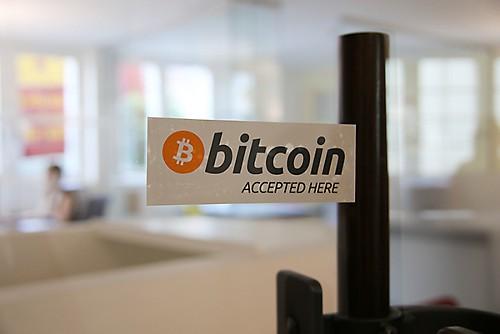Over the last half year, the Swiss Municipality of Zug has been accepting Bitcoin as payment for municipal services. The pilot started in July, and runs till the end of this year. According to Niklas Nikolajsen, CEO and cofounder of the Bitcoin Suisse trading house in Baar, this is the first case of a government agency accepting the cryptocurrency.
Cryptocurrency
Bitcoin is a digital currency based on the blockchain technology. Its wallets and transactions are protected by strong cryptography — hence the term cryptocurrency — while its distributed (decentralised) transaction store serves as a public ledger.

Policy Context
The Municipality of Zug has been accepting Bitcoin payments up to a value of CHF 200 (about 180 Euro). Typical applications are fees for small government services like issuing a birth certificate, a proof of residence, or an identity document. The decision to do so was made by the City Council on 3 May.
This move fits the city's ambition to become a regional hub for the financial technology (fintech) sector in Switzerland.
Crypto Valley
In the last few years the Zug region has become home to a cluster of companies in the digital finance sector. The Swiss "Crypto Valley" already includes more than fifteen companies. By accepting Bitcoin as an official method of payment, the City Council wanted to send a message to fintech companies and the public.
We want to express our openness to these new technologies and gain experience at an early stage of their development,
mayor Dolfi Müller said at the start of the pilot. We are inviting fintech companies in our region to exchange ideas with the City Council. We aim to get a better understanding of their needs for optimal development in our home city and economic area.
Official currencies
What makes this move by the Municipality of Zug special is that governments who accept currencies other than their own for taxes and fees lose the ability to impose a hidden tax on holders of the official currency by "printing" additional money.
We are used to having a central bank that influences the supply of money in the market,
Müller says. As a matter of fact, all commercial banks have influence through the creation of money. Since many of the world's banks depend on the exchange rate with the US dollar, however, their room for manoeuvre is limited.
So far, people have trust in currencies because of the whole economy that is behind them. In the case of cryptocurrencies, you only have to have trust in technology. In Switzerland, we already have a parallel currency called WIR-Geld, which works really well as long as there is a market for it. Cryptocurrencies will be succesful if there are enough people on the supply and demand sides of the market.
According to Müller, the blockchain technology has great potential in transactions as well as e-governance. And there will definitely be cryptocurrencies in the future world. It may be Bitcoin, it may be not.
Description of the way to implement the initiative
According to Müller, nothing special had to be undertaken to start accepting Bitcoin. The City just created an electronic wallet and communicated its address to the public. The cashiers were given a short introduction on how to work with the wallet. That was all. The procedure is very simple, and we did not have any costs involved with the implementation.
There was also no need to add any additional fees to the current exchange rate for citizens willing to pay their levies in Bitcoins.
Technology solution
Müller emphasises that the Municipality of Zug did not create a new currency. We just accept the existing Bitcoin currency for payments of certain services the City provides.
Our taxpayers, of course, expect us to not lose money on these transactions. So all transactions are hedged [meaning that the received Bitcoins are instantly and automatically exchanged for Swiss Francs in an electronic marketplace], so we cannot lose due to the volatility of the Bitcoin exchange rate.
Main results, benefits and impacts
In September, two months after the start of the pilot, only a dozen transactions had been made, mostly for copies of certificates and identification documents. According to town clerk Martin Würmli, these Bitcoin transactions were mainly made by younger people.
Since then, the number of Bitcoin transactions made has not increased. According to Müller, the actual number is not important. There are not many people with a Bitcoin wallet in Zug. The symbolic value of this initiative has been far more important than the practical value. In the future, however, everything we do will has to have practical value as well. The main goal for our administration for 2017 is digitalisation; we have some good ideas we will be working on.
Return on investment
Interest in our Crypto Valley is high,
Müller says, even though we do not know exactly why these companies come to Zug or Zürich. The Canton [district] of Zug has the main responsibility for the region's strategy, not the Municipality of Zug.
Over the last half year, we have improved our contacts with the firms that were already here by organising round tables. From those we learnt that fintech companies come to Switserland because of our tradition of democracy and decentralisation. Their primary needs are a good relationship with the banks, and open-minded people in the government.
The most important message to us is that our city faces really big challenges for the future.
Lessons learnt
Over the coming weeks, the pilot will be evaluated. Then the City Council will decide whether Bitcoin — and possibly even other digital currencies — will be accepted in the future for further municipal and urban services.
For now, the Municipality of Zug will continue to accept Bitcoin as it has been doing, Müller says. There are no plans to accept other cryptocurrencies than that.
Scope: Regional (sub-national)

Comments
Bitcoins and other currencies that are not the national usual ones have a problem: their value changes too many.